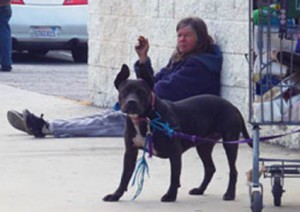
Face reddened by sun and weather, the woman was tense with distrust and fear. Her dog, a muscular black pit bull stood ready to protect her at the end of a fraying rope leash.
Why would a person without a home have a dog?
For some of the same reasons we all turn to dogs: comfort and companionship; the support of a loyal, nonjudgmental friend; and protection.
Between 5 to 10 percent of homeless people have dogs or cats or both, according to Pets of the Homeless. With an estimated 3.5 million homeless Americans, according to the National Coalition on Homelessness, that’s 175,000 to 350,000 pets. In some areas of the country, 25 percent of the homeless have pets, pushing those numbers still higher.
For the person living on the street with little or no money, there are real challenges taking care of a pet.
- Getting their dog medical attention means finding transportation to a clinic, being separated from their dog and fearful of not getting it back, and having no money to pay for services.
- Escaping from heat, cold or rain may not be possible for a homeless person and their pet because most shelters don’t allow dogs.
- Without someone trustworthy around, a homeless person may avoid seeking medical care for themselves because there is no one to watch the dog.
- Feeding a dog often means sharing human food with them instead of being able to buy and store food designed for dogs.
Pets of the Homeless has taken a sensitive and focused approach to the problem by:
- Recruiting veterinarians, doggie day care centers, groomers, churches, senior centers, animal rescue organizations and shelters and others to serve as collection sites to accept donations of pet food, leashes, collars, flea and tick treatments, blankets and treats for the pets of homeless people.
- Deliver donations to organizations equipped to distribute them at food pantries, homeless shelters and soup kitchens.
- Sponsor veterinarians to go where the homeless gather to offer vaccinations, spaying and neutering and other types of medical care at Wellness Clinics.
- Provide collapsible crate to homeless shelters to enable those with dogs to stay there.
You can help with this effort by locating a collection center near you and dropping by to donate pet food, blankets, flea and tick treatments, collars, leashes and treats.
You can also donate cash to Pets of the Homeless, 206 S.Division St., Suite 10, Carson City, NV 89703. Besides being tax-deductible, donations make a great way to honor someone or to make a gift.
My own dog came to me after being picked up as a stray on the street. The gifts I have made to Pets of the Homeless are small expressions of the gratitude I feel for having a home and having a dog to share that home with.